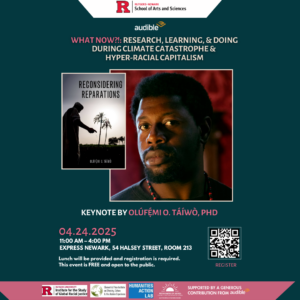Environmental Justice
“We face so many overlapping and intersecting crises that we can’t afford to fix them one at a time. We need integrated solutions, solutions that radically bring down emissions while creating huge numbers of good, unionized jobs and delivering meaningful justice to those who have been most abused and excluded under the current extractive economy.” ― On Fire: The Case for the Green New Deal

Image credit: Image credit: Emebet A. Jigssa. (2023). Earth Satellite Image Imitation Abstract. https://icpac.medium.com/how-can-art-amplify-efforts-to-address-climate-change-7d775b261f08
Dates:
Wednesday, April 23, 2025 | Express Newark, 54 Halsey Street, 2nd Floor, Room 213, Newark, NJ 07102 | Download Program | Presenter Slideshow
Click here to view recorded livestream!
Thursday, April 24, 2025 | Express Newark , 54 Halsey Street, 2nd Floor, Room 213, Newark, NJ 07102 | Download Program | Presenter Slideshow
Click here to view recorded livestream!
Wednesday, April 23, 2025
Time(s): 9:00 am – 6:00 pm
Cost: Free and open to the public.
Accommodations: Please submit accommodation requests to sawyerseminar@newark.rutgers.edu by Friday, April 18, 2025.
Overview: The seminar Reparative and Restorative Paradigms for Environmental Justice, examines local and global perspectives to the existential challenges posed by climate change. The seminar will consider how reparative and restorative approaches to environmental justice may offer more inclusive opportunities to re-imagine the terms of citizenship and self-government; ones that embed the interconnectedness of humans and their ecology in culture, politics, and laws. Recent conversations about reparations in the United States have drawn on both history and analyses of current economic, social, and political perspectives to propose reparative practices that range from monetary compensation to targeted policies that address racial disparities in wealth, housing discrimination, and education access, among others. At a wider scale, scholars like Olúfẹ́mi O. Táíwò have offered a constructivist view of reparations that proposes a historically informed project of distributive justice that serves a larger and broader world-making process. The project of reparations, therefore, has a forward-facing orientation that by necessity is anchored in the past.
9:00 – 9:45 AM: Breakfast
9:45 – 10:00 AM: Introductory and Opening Remarks
Mayte Green Mercado, Associate Professor of History, and the Newark Campus Director of the Institute for the Study of Global Racial Justice
10:00 – 11:45 AM: Panel Ecocide in the Middle East
Kali Rubaii, PhD, Assistant Professor of Anthropology, Purdue University
Shourideh C. Molavi, PhD, Postdoctoral Research Fellow, Forensic Architecture
Mariam Abazeri, PhD, Presidential Postdoctoral Fellow, School of Human Evolution and Social Change, Arizona State University
Amir Moosavi, Assistant Professor of Comparative Literature, Moderator
11:45 – 12:05 PM: Presentation by AAUP-AFT Climate Justice Committee
Paul O’Keefe, Presenter
12:35 – 1:45 PM: Lunch
1:45 – 2:00 PM: Presentation by Pantry+,
Hend El-Buri, Presenter
2:00 – 3:20 PM: Green Amendments: Legal and Constitutional Frameworks for Environmental Justice
Commissioner Shawn M. LaTourette, New Jersey’s Commission of Environmental Protection
Maya K. van Rossum, Founder of the Green Amendment For The Generations Movement
Quinn Yeargain PhD, Associate Professor of Law, Michigan State University
Brian Phillips Murphy, Associate Professor of History, Moderator
3:20 – 3:30 PM: Coffee/Tea Break
3:30 – 5:30 PM: Mini Film Screening Mann v. Ford and The Meaning of the Seed
Anita Bakshi PhD, Instructor, Rutgers University, The State University of New Jersey – New Brunswick
Wayne Mann, Ramapough Lenape Nation
Micah Fink, Emmy-Nominated Producer and Director of Mann v. Ford
Jack Tchen, Director, Clement A. Price Institute on Ethnicity, Culture, and the Modern Experience, Moderator
5:30 PM Closing Remarks

Thursday, April 24, 2025:
Time(s): 11:00 am – 4:00 pm
Cost: Free and open to the public.
Accommodations: Please submit accommodation requests to sawyerseminar@newark.rutgers.edu by Friday, April 18, 2025.
Overview: The School of Arts and Sciences –Newark and Audible Environmental and Climate Justice Lecture What Now?!: Research, Learning, & Doing During Climate Catastrophe and Hyper-racial Capitalism, which will feature a keynote and conversation with Olúfẹ́mi O. Táíwò, author of Reconsidering Reparations and Elite Capture; Vincent Mann, Chief of the Ramapough Lenape Nation Turtle Clan; María López Nuñez, co-founder of Agency, a people-first environmental justice firm; and Mia White, Assistant Professor of Environmental Studies at The New School. The conversation will be moderated by Jean-Pierre Brutus, senior counsel in the Economic Justice Program at the New Jersey Institute for Social Justice.
11:00 – 11:10 AM: Indigenous Blessing
Vincent Mann, Chief of the Ramapough Lenape Nation Turtle Clan
11:10 – 11:20 AM: Welcome Remarks
Jeffery Robinson, Interim Chancellor Rutgers University–Newark
11:20 – 11:30 AM: Introduction of Keynote
Mayte Green Mercado, Associate Professor of History, Director of the Institute for the Study of Global Racial Justice Rutgers University–Newark
11:30 – 1:00 PM: Keynote Address and Discussion
Olúfẹ́mi O. Táíwò, Associate Professor at Georgetown, and author of Reconsidering Reparations and Elite Capture
Mia White, Assistant Professor of Environmental Studies at The New School, Moderator
1:00 – 2:00 PM: Lunch
2:00 – 4:00 PM: Environmental and Climate Justice Panel
Vincent Mann, Chief of the Ramapough Lenape Nation Turtle Clan
Olúfẹ́mi O. Táíwò, Assistant Professor at Georgetown, and author of Reconsidering Reparations and Elite Capture
María López Nuñez, Co-founder of Agency, A People-First Environmental Justice Firm
Jean-Pierre Brutus, Senior Counsel in the Economic Justice Program, New Jersey Institute for Social Justice, Moderator
4:00 PM: Closing Remarks